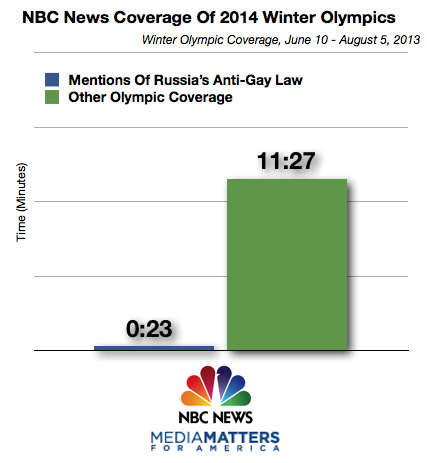 NBC Universal has pledged to report on the impact of Russia's draconian new anti-gay laws during its exclusive coverage of the 2014 Winter Olympics, but its financial stake in maintaining a positive relationship with the International Olympics Commission (IOC) raises questions about the network's ability to be objective in its reporting.
NBC Universal has pledged to report on the impact of Russia's draconian new anti-gay laws during its exclusive coverage of the 2014 Winter Olympics, but its financial stake in maintaining a positive relationship with the International Olympics Commission (IOC) raises questions about the network's ability to be objective in its reporting.
NBC has faced increasing pressure to report on Russia's harsh anti-gay laws - including a measure that bans vaguely defined pro-gay “propaganda” - during its coverage of the 2014 Winter Olympics in Sochi this February. Despite assurances from the IOC, Russian officials have warned that the law will be enforced against Olympians and visitors who display or demonstrate support for LGBT equality during the games.
Mark Lazarus, chairman of the NBC Sports Group, has stated that NBC will "acknowledge" the law in its coverage if it affects the Olympic Games in any way, saying, “If it is still their law and it is impacting any part of the Olympic Games, we will make sure that we acknowledge it and recognize it.”
But NBC's ability to objectively cover the Olympic controversy is potentially threatened by the network's own financial interests. As Time magazine reporter Sean Gregory noted, NBC paid the IOC more than $4 billion for television rights to the Sochi Olympics, as well as rights to the 2016, 2018, and 2020 Olympics. The hefty price tag demonstrates how valuable NBC considers its exclusive access to the Olympic Games to be, an agreement which is granted by the IOC directly.
NBC's close relationship with the IOC is likely to become problematic as the IOC begins to take its own precautions to crack down on pro-gay “propaganda.”
On August 12, Gay Star News reported that the IOC announced it would punish any athlete who attempted to protest Russia's propaganda law during the games. According to GSN:
[T]he IOC replied the games were not the place for 'political' statements. Any participant who steps out of line may be punished, not by the Russians but by Olympic chiefs themselves.
LGBT rights campaigners have called on athletes to wear 'rainbow pins' to show their support for LGBT people in the opening and closing ceremonies.
The Olympics own charter describes such things as “propaganda” -- the same word used by the Russians in their new anti-gay law which stops homosexuality being “promoted” to minors.
Under rule 50 of the IOC's charter: “No kind of demonstration or political, religious or racial propaganda is permitted in any Olympic sites, venues or other areas.”
GSN had asked what the global Olympic chiefs thought about plans for athletes to wear rainbow pins or hold hands during the opening and closing ceremonies.
In other words, the IOC plans to act as the de facto enforcer of Russia's “propaganda” law. Athletes hoping to protest Russia's anti-gay policies risk punishment and even disqualification by the IOC, even if Russia ultimately decides not to enforce its own gag-rule.
The IOC's decision to prohibit “propaganda” makes it a willing participant in the enforcement of Russia's crackdown at the Winter Games. It also makes it a target for news outlets - like NBC, for example - looking to implicate the IOC with the draconian silencing of pro-gay Olympians.
Thus far, NBC's coverage of the Olympic controversy has been mixed. NBC's news programs largely ignored Russia's anti-gay law in the weeks following its passage, but they have since devoted several segments to covering the measure - though none have directly discussed the IOC's enforcement of a pro-gay gag rule:
The question is: will NBC be willing to jeopardize its exclusive relationship with the IOC by adequately reporting on the controversy if the organization becomes the villain in the story of the Sochi Olympics?
